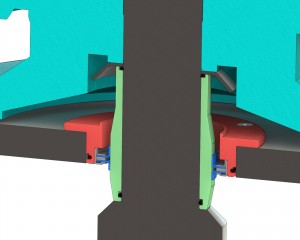Viscosity
Defines a fluid’s flow resistance. In the metric system, absolute viscosity is expressed in poise.
Absolute viscosity
The same meaning as the word viscosity used alone, to distinguish from empirical viscosity or kinematic viscosity. This represents the ratio of a fluid’s shear stress to its velocity gradient. It is a fluid’s internal flow resistance. Its unit of measure is the poise. The absolute viscosity divided by the fluid’s density gives the kinematic viscosity. This is sometimes also called dynamic viscosity. Absolute viscosity and kinematic viscosity are expressed in fundamental units. Empirical viscosity, like Saybolt viscosity, is expressed in arbitrary units of time, usually seconds.
Kinematic viscosity
This is the time required by an oil to flow through a capillary tube under the force of gravity. The unit of kinematic viscosity is the stoke or the centistoke (1/100 of a stoke). Kinematic viscosity is defined as the quotient of a fluid’s absolute viscosity in centipoises over its specific gravity, both measured at the same temperature.

 A arte da mistura
A arte da mistura 




